From the moment you notice your first pregnancy symptoms, you become obsessed with protecting your growing baby.
Naturally, one of the first questions you have is: How much pressure can a pregnant belly take?
Your primary instincts are telling you to keep it safe at all costs.
While you have the urge to cuddle and pat your baby bump all the time, you also want to make sure you don’t make a wrong move and accidentally hurt your baby.
Well, even though your worries are justified, your womb protects your baby more than you think.
But that doesn’t mean that accidents don’t happen and that you shouldn’t do everything in your power to prevent them.
That’s why I’m here – to give you all the info regarding the amount of pressure your belly can take and ease all of your concerns.
Car Accidents

Cars, buses, and other motorized vehicles are a part of your everyday life.
Of course, this doesn’t end once you get pregnant.
You’ll keep on driving or being a passenger.
And, even if we don’t like to think about it, the truth is car accidents are not as rare as we’d like them to be.
Being in a car accident is dangerous and frightening for everyone, let alone for a pregnant lady who is always extra cautious and worried about her growing baby.
So, how much pressure can a pregnant belly take while in a car crash?
Well, it all depends on several factors.
When you’re in a minor car accident, while you’re not expecting, the only consequence you’ll probably have is trauma and fear.
But the reality is that, when you’re pregnant, even the slightest accident can be dangerous or even fatal for your baby.
Sometimes, you’re convinced that nothing is wrong with you and that you’ve come out the other end unharmed.
But you can’t truly know whether your fetus or placenta is hurt in any way until you go and see your ob-gyn.
Nevertheless, there are some symptoms you mustn’t ignore.
If you feel any of these things, go see your healthcare provider right away:
• Pain in the lower abdomen
• Vaginal bleeding/discharge
• Abdominal bruises
• Changes in fetal movement
• Urinary problems
Some of the possible consequences of car accidents while pregnant are:
Miscarriage

Luckily, miscarriages are a very rare consequence of car accidents.
The amniotic fluid and the uterus protect your fetus so even if your belly suffers a hit or any kind of pressure, there shouldn’t be a problem.
Nevertheless, miscarriages do happen in cases of uterine perforation or when a mother suffers from cardiac arrest.
Preterm labor
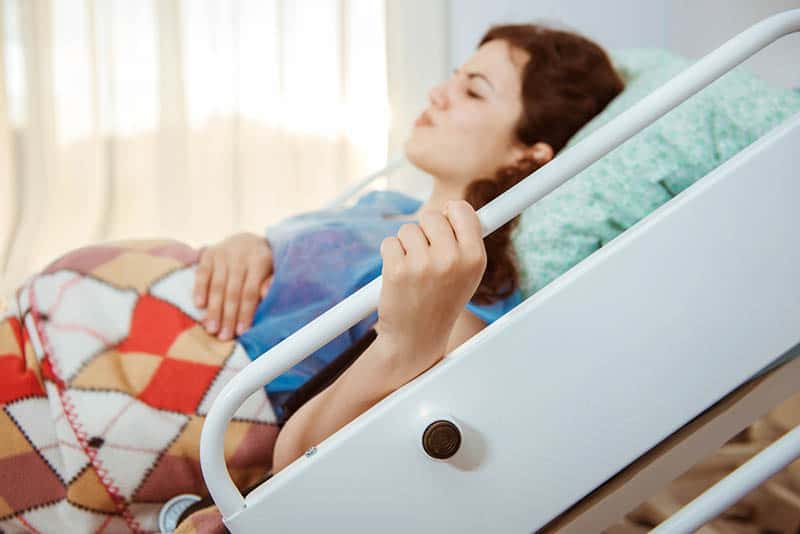
When you’re in a car accident, your entire being, including both your mind and body undergo a lot of stress.
It shouldn’t come to you as a surprise that this affects your baby, as well.
This is especially the case with pregnancies that are high-risk.
Even though your pregnancy can become high-risk after a car crash, it’s more likely for a mother with pre-existing health conditions to go into preterm labor.
Fetus defects
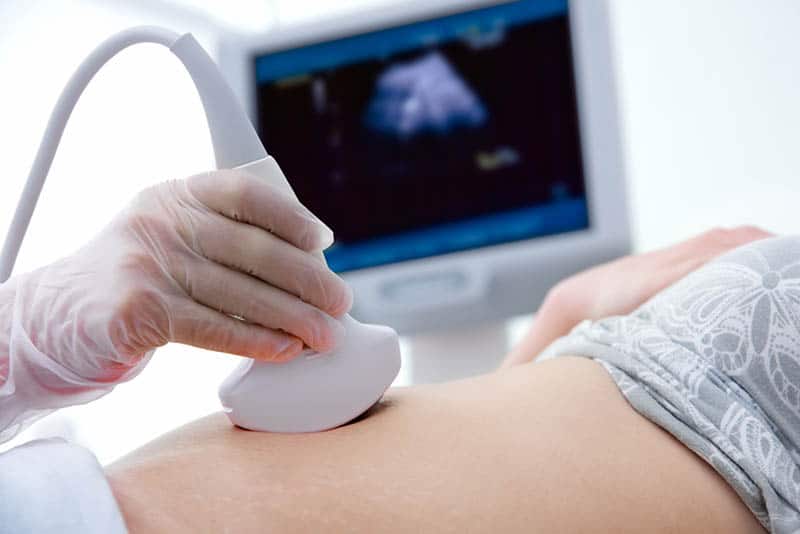
Sometimes, the hit in the belly isn’t so severe as to cause a miscarriage but it still injures the fetus.
There are situations in which these injuries influence the quality of the entire child’s life as well as their health.
This is usually the case when the fetus suffers a serious brain injury.
Placental abruption

Maybe the most common consequence of car accidents while pregnant is placental abruption.
Simply put, this means that the placenta separates from the uterus before you go into labor.
Symptoms that follow the placental abruption are usually excessive vaginal bleeding and extreme stomach pain.
But how much pressure can a pregnant belly take without causing the separation of the placenta?
Motor trauma, such as a car accident can cause this condition.
You might think that you need to be in a major car crash for this to happen but the truth is that the placenta is much more sensitive than you think.
The worst part is that this condition is likely to have fatal consequences for the fetus but it is possible for a baby to survive it.
Driving While Pregnant

For many pregnant women, driving a car, especially when it comes to distant locations seems like a real nightmare.
You have to pee literally every five minutes and you’re in constant fear that you might do something to accidentally hurt your belly.
The number one concern you probably have is the position of your belly in relation to the steering wheel.
Well, the key is to adjust your seat the right way and the way that suits you best.
The steering wheel shouldn’t pressure your growing belly but don’t put yourself in an uncomfortable situation by moving too far away from it.
Also, always wear a seatbelt while driving because it can literally save your life.
Don’t even think of putting the shoulder strap behind your back or under your arms – keep it between your breasts at all times.
I would love to tell you to relax but sadly, I know that’s impossible.
You simply must be on the constant lookout when you’re driving.
Nevertheless, that doesn’t mean that you should let yourself panic.
Trust me, this will only be counterproductive.
Your attention span will decrease and you’re likely to make a mistake.
That’s why my advice is to do your best to balance being careful and relaxing and you’re good to go.
Falling
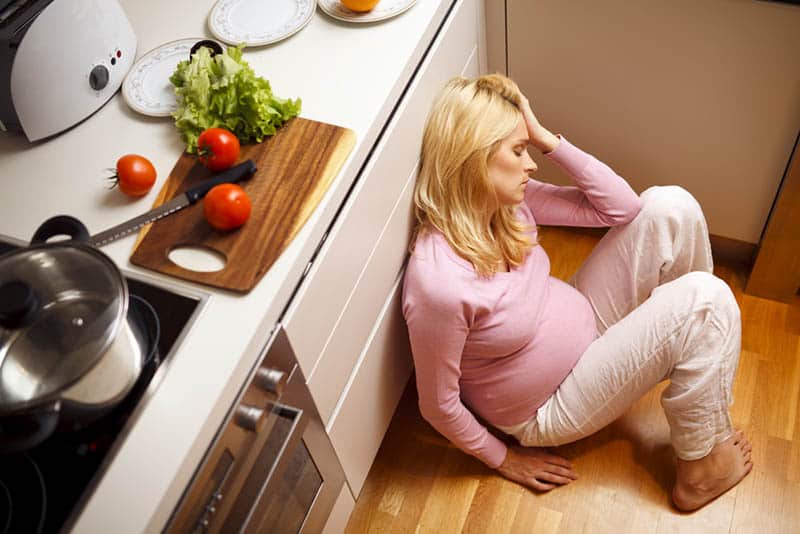
You probably think that falling on your belly will never happen to you.
After all, what are the odds of this happening?
Well, when you have a growing belly, this scenario is more common than you might think.
You’ve gained weight and your entire body’s balance is out.
As your stomach grows and your labor date approaches, moving around might become more difficult.
This is when you have to be extra careful not to fall down.
Don’t get me wrong, I’m not telling you to lie down during your entire pregnancy (unless these are the doctor’s orders) – just pay more attention to your moves because one wrong one can cause you a lot of trouble.
The good news here is that a light fall will probably never injure you or your baby but, if you fall hard enough, it can certainly be problematic.
Of course, the angle of your fall and the exact spot which takes the impact are crucial, as well.
This is another situation where placenta abruption, miscarriage, premature delivery, or fetal injuries are possible, even though they’re not likely.
If you suffer from placental abruption, you’re likely to feel the first symptoms within a few hours after your fall.
But just to be sure, it’s better to wait until the 72hour period is over – that’s when you’ll know for sure that nothing bad has happened.
When it comes to fetal injuries, once again, we’re talking about skull injuries in most cases.
Of course, as an expecting mom, you can also suffer some consequences.
When you’re not pregnant, you don’t see a simple broken bone as a big deal.
However, that’s the last thing you need when you’re pregnant and already have trouble moving around.
Either way, you should see the doctor if a vaginal discharge or amniotic fluid appears, if contractions start (whether you’re near your due date or not), the baby stops moving (or is moving much slower than normal), or you feel any unusual pain.
I would advise you to see the doctor even if you don’t feel any of these symptoms after falling on your belly.
The doctor will probably check the baby’s heart rate and monitor their activity, just to make sure there’s nothing to worry about.
If you’re scared of a fall that might hurt your baby or feel that you’re losing your balance, the first thing you have to do is get rid of high heels and other unstable shoes. Instead, replace them with shoes that have a non-skid surface.
Don’t worry, this is only temporary – you’ll get back to wearing them as soon as possible.
Also, avoid carrying things in both hands.
I know that this might seem silly but trust me when at least one of your hands is free, the outcome of your potential fall will be different.
This way, you’ll instinctively lean on that hand and your belly will go unharmed.
Another thing you should be doing is holding on to something when you’re walking.
There’s no need to walk with an actual cane – it will be enough to hold on to handrails, especially when you’re going down or up the stairs or are walking on uneven surfaces.
Weight Lifting
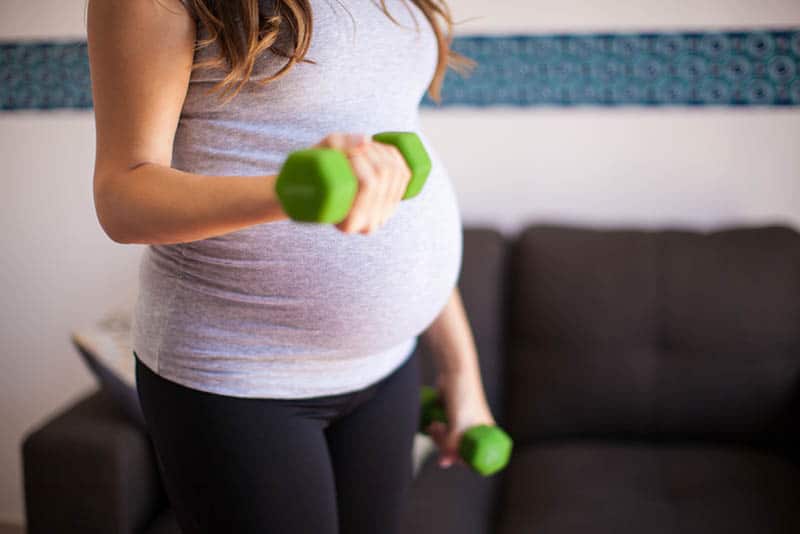
Whether you like it or not, one of the things you can expect from your body in the postpartum period is extra weight.
That’s exactly why a lot of women decide to take matters into their own hands while they still have the time to.
So, they hit the gym. Of course, a typical part of exercising in the gym is also strength training, which includes weight lifting.
Doing strength training while pregnant can have a lot of benefits if your doctor gives you the go-ahead.
This way, you make your body much stronger and prepare it for labor.
Also, you strengthen your muscles and therefore avoid potential lower back, ligament, and pain in your shoulders as your belly grows.
Even though weight lifting is not a direct hit on your belly, it’s important to note that there is certainly some pressure on it.
Now you’re probably wondering: What’s the best way to keep my baby safe while weight lifting? How much weight should I lift?
Well, the good news for those who did strength training before pregnancy is that you can continue doing so.
Naturally, you’ll have to adjust your exercises to suit your current condition.
First and foremost, you should avoid straining too much.
Cross-fit training is also a thing of the past.
After you pass 12 weeks of pregnancy, you should stop lifting weights while lying on your back.
Also, lifting over your head is a big no in the last trimester of pregnancy.
The importance of breathing techniques while exercising can’t be emphasized enough, regardless of whether you’re pregnant or not.
When you’re expecting, refrain from holding your breath while lifting weights.
According to some research, it’s safe for a pregnant lady to lift 25 pounds and less, without any danger.
You can do weighted squats, which will help you with your posture and will definitely strengthen the muscles you need for labor.
But, your pregnancy exercise doesn’t necessarily have to end here.
You’re allowed to lift up to 50 lbs from time to time.
Whatever you do, the important thing is to notify your trainer that you’re expecting (if your baby bump isn’t showing yet).
Also, if you continue weight lifting in the second or third trimester of pregnancy, keep in mind that you’ll probably need a spotter in order to keep up with exercising safely.
Running
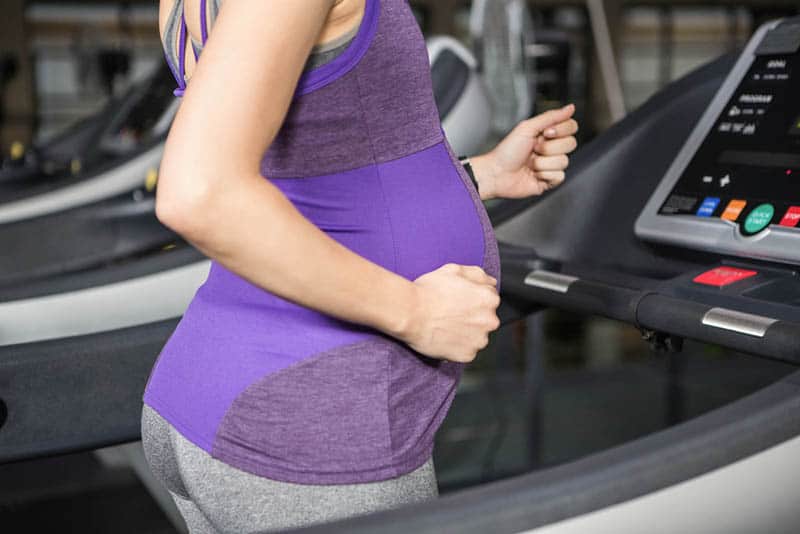
Running itself won’t cause any trouble in a healthy pregnancy unless you get too tired or pressure yourself too hard to achieve the speed or mileage your body is clearly not capable of achieving.
In fact, running and jogging are probably the healthiest ways of exercising if you don’t have a complicated pregnancy.
It prevents diabetes, helps your baby’s brain develop better, and keeps you in shape.
Not only that but running can also prevent high blood pressure or toxemia during pregnancy as well as the baby being born with a high birth weight.
Besides, running helps with your mental health.
It has proven to be a great tool against the potential anxiety and depression that many pregnant women sadly face.
So, now that you know all the benefits, you might assume that nothing could possibly go wrong for a pregnant woman while running.
Nevertheless, the problem with this kind of exercise is that it increases the risk of accidentally falling on your belly – the dangers of which we have already discussed.
Also, running can be dangerous if you already have pre-existing health problems.
It’s especially risky for those of you who have problems with the placenta or have pre-eclampsia.
If you’re carrying twins or multiples, you should also avoid running unless you want to put yourself at risk of miscarriage or premature labor.
Reading all of this, you could potentially think that this information is common sense.
After all, what pregnant woman in her right mind will go out jogging if she struggles with vaginal bleeding?
Well, the truth is that not all of these issues are visible right away.
The highest risk of complicating your condition is doing something to worsen it while not being aware of what’s going on in your body.
Your optimal running time shouldn’t exceed 30 minutes or one hour if you feel that you can continue – but speed is even more important.
Don’t push yourself over your limits and certainly don’t expect to be in the same form you were before pregnancy.
You will get tired sooner and more and that is something you can’t and shouldn’t fight.
Also, you will sweat a lot more. That means that you shouldn’t even consider going jogging without enough water supply.
Of course, this advice applies to all runners out there but when you’re pregnant, it’s even more important.
Don’t forget that your bladder has its own life now, due to the pressure of the baby.
So, when you’re planning your route, keep in mind that you’ll probably have to pee more often than usual.
Even though it’s a proven fact that running can help you chase away your morning sickness, especially in the first trimester, it all depends on whether you’ve been able to keep some food in your system or not.
If you’re one of those pregnant ladies who throw up literally everything you put in your mouth, running is a big no-no.
You might not feel hungry but trust me on this one, your body needs its nutrients and you can’t force any physical activity on it if it hasn’t been fed.
Finally, the most important thing here is to listen to your own body and mind.
Forget about comparing yourself to other pregnant women and most of all forget about comparing yourself to pre-pregnant you.
Blow To The Belly
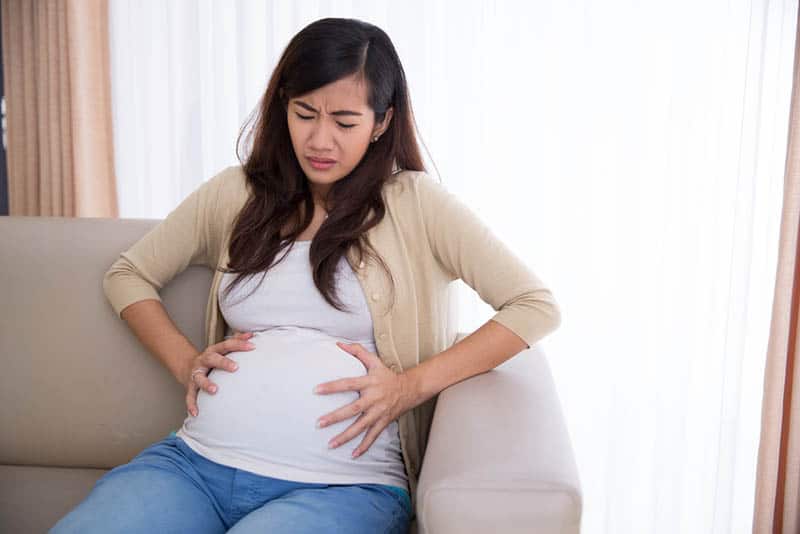
Abdominal trauma in pregnancy is much more common than you might think.
As careful as you’re trying to be, accidents happen and sometimes you can’t avoid them.
If you do hit yourself in the belly by accident or something similar happens, please don’t blame yourself.
After all, you’re just a human being and you can’t control everything and everyone around you.
You know very well that you’re doing everything in your power to protect your belly and your little bundle of joy.
After all, remember that your body is not as fragile as you might think.
Your baby is quite protected in your womb, which has a lot of muscles and can be stretched.
But your uterus is not the only thing protecting your little one.
There is also the amniotic fluid with its shock absorbers and the weight you gain during pregnancy.
Basically, your womb together with your weight, the placenta, and the amniotic fluid serves as an airbag or a cushion for your baby that protects them from every possible trauma.
But, if you do think that you’ve received a blow to the belly that could be harmful to the fetus, seek immediate medical help.
Sometimes, you can fall or be hit in the stomach but you don’t feel any consequences right away.
Even in those cases, informing your doctor is the right thing to do – just to be sure.
When you see the doctor, you’ll probably undergo a non-stress test.
Simply put, the doctor will use a fetal monitor.
The name says it all. It serves to monitor your baby’s activities.
It helps to see if there are any problems with the placenta or the fetus itself.
This test lasts a couple of hours because it’s necessary for the doctor or midwife to track the baby’s activity for some time before coming up with a result.
The ultrasound can’t determine the state of the placenta but it can check the baby’s heartbeat, which is sometimes enough.
Either way, a medical professional is there to tell you more about the tests that need to be performed.
Toddlers And Pets

When you’re pregnant, everyone has an uncontrollable urge to give you a big hug and pet your belly.
Even though this might start to annoy you after a while, you have to know that people do this because they love you and can’t wait to hold your baby.
This is their way of bonding with him or her and getting in touch with your little one, so do your best to understand.
Of course, adults will know how to pat your belly without hurting you.
They’re aware that there is a little, fragile creature hidden in there and they’ll do everything with extra care.
But what about toddlers?
Sometimes, they get so affectionate that they can’t control the strength of their touch.
They want to hug you with the same intensity they used to, they want to run into your arms and they expect you to pick them up, as you always did.
This is a very important part of your pregnancy.
As a good parent, you want to connect your older child with the baby while they’re still in your womb.
It’s your job to teach them that this is their brother or sister and they should love them gently starting now.
Naturally, this doesn’t always happen so easily.
It’s common for toddlers to be jealous of their siblings even before they arrive in this world.
They see that something big is going to happen as they don’t have your undivided attention anymore.
Besides, they still need their mommy and the last thing they should feel now is emotional neglect.
They want to be able to be in touch with you the same way they used to and they don’t want to be denied the affection they’ve had from the very first day of their life.
Problems with jealousy and rebellious children are not uncommon after the baby arrives.
Therefore, it would be catastrophic for your older child to start feeling unloved already, even before you give birth.
So, the worst thing you could do at this point is push them away every time they try to jump into your arms or pat your belly.
Instead, you should encourage them to form a bond with their sibling who’s on the way.
But at the same time, it’s obvious that you can’t allow anything to happen to your belly either.
Therefore, you have to find a way to teach your toddler how to be careful but at the same time show them that you’re delighted by their interest in their sibling and your pregnancy.
Look, even if your kid pats you a little harder on the belly or jumps on you, it’s unlikely that something bad will happen to your unborn baby.
Nevertheless, you’ll probably be anxious and you’ll watch their every move to prevent any possibility of an injury.
That’s why you have to talk to your older child as sincerely as possible.
Tell them that mommy still loves them unconditionally but that they need to be a little more cautious when approaching you until you give birth.
Talk to them about how delicate your baby still is.
No matter how small they are, I bet they’ll understand.
Not only that, they’ll automatically get the urge to protect the baby at all costs so they’ll invest extra care in all physical contact they have with you.
A similar situation can happen with your pet as well.
They’re probably used to jumping on your lap without any prior notification.
So naturally, you’re scared that they’ll hurt your baby in the process and wonder how much pressure can a pregnant belly take.
Well, if you have a pet who is under 40 pounds – there’s nothing to be worried about.
That is, you don’t have to worry about them pressuring your belly.
But you have to be careful not to trip over them.
When it comes to pets over 40 pounds, them jumping on your belly can definitely hurt the growing fetus.
That’s why you have to find a way to teach them not to do that.
If you think this is impossible, do your best not to be alone in the room with them until you give birth because this way, someone else can amuse them and they won’t be interested in your baby bump.
Sleeping On Your Belly

If you’ve been sleeping on your stomach for as long as you can remember, it’s natural to wonder whether you can continue doing so now that you’re pregnant.
Well, I’m here to give you the answer.
There’s nothing wrong with continuing to sleep on your belly even after you’ve noticed pregnancy symptoms.
To be precise, it’s perfectly okay to do so until you reach the 16th or 18th week of gestation.
Until this period, your belly won’t show so there won’t be any obstacles in the way of you sleeping on it.
The most important thing here is that this sleeping position won’t hurt the baby.
It’s perfectly safe since the uterus and the amniotic fluid protect your growing fetus.
But, as your pregnancy progresses and your belly starts to grow, this position will become uncomfortable for you.
In fact, as you approach the third trimester of pregnancy, it will practically become impossible to sleep like this.
Therefore, I suggest you find your perfect sleeping position before then – for your sake, not the baby’s.
Once you give birth, you can go back to your favorite position (unless you’re recovering from a C-section).
Yoga
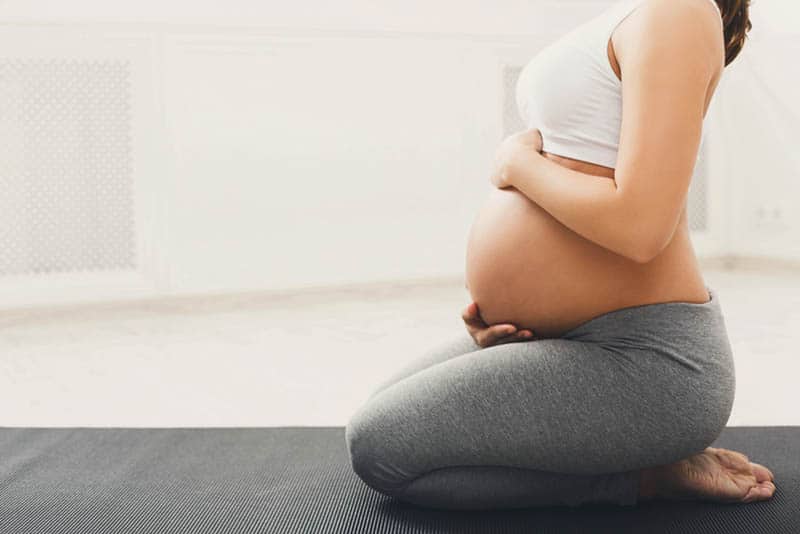
If you were a big fan of yoga before you got pregnant, I’m sure you’ll want to continue with your practice after gestation.
Besides being beneficial for your mental health, it is also good exercise for your lower back, ligaments, and other body parts.
But, is it safe to perform yoga while pregnant? Well, even though yoga is great during pregnancy, there is a type of yoga that you should give up on until you give birth.
This type of yoga is hot yoga.
For those of you who don’t know what it is, this is basically “regular” yoga performed in special conditions.
It takes place in humid and hot rooms which should make you sweat as much as possible so it’s best to avoid it for the time being.
How Much Pressure Can A Pregnant Belly Take In The First Trimester?

Your baby is the most fragile and vulnerable during the first trimester of pregnancy, i.e. the first 12 weeks.
But this is also the time during which your fetus is the safest if you happen to be in a car accident.
How Much Pressure Can A Pregnant Belly Take In The Second Trimester?

It’s safe for you to lift up to 36 lbs until the 20th week. Of course, this applies only to low-risk pregnancies.
Once you reach the 21st week, the weight of the people or objects you can lift should be reduced to 26 lbs.
When it comes to car crashes and other hits, this is a riskier period in comparison to the first trimester of pregnancy.
During this time, your injuries can cause a miscarriage, a premature delivery, and a hemorrhage (bleeding in the brain) to the baby.
How Much Pressure Can A Pregnant Belly Take In The Third Trimester?
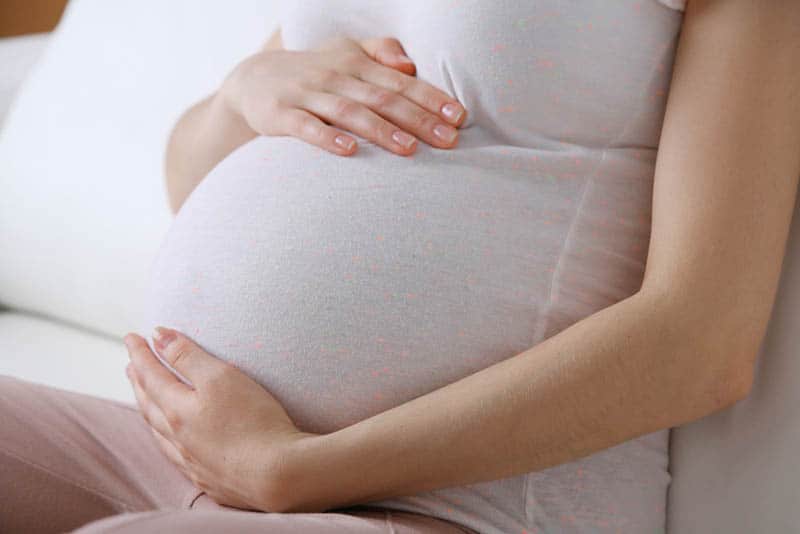
Even though a placental abruption can happen at any point after the 20th week of pregnancy, it is more common in the third trimester.
At the 20th week of pregnancy, your uterus moves forward to your belly button, which can cause constipation, cramping, and heartburn, as the uterus puts pressure on the stomach.
Keep in mind that this is the riskiest part of your pregnancy for your unborn child when it comes to the hits you might receive in your belly.
This is the period when every injury you get is potentially hazardous for your baby.
Besides placental abruption, this is also the time when you can have a premature or stillbirth or when your baby can suffer a head injury that might leave neurological consequences.
Another reason why it’s risky is the size of your belly during pregnancy.
You become clumsier than ever and you have the highest potential risk of hitting your belly while just walking or doing everyday activities.
In Conclusion
Even though it’s perfectly natural for you to wonder how much pressure can your belly take, please don’t let this worry overwhelm you to the point where you can’t enjoy your pregnancy to the fullest.
Be careful but don’t obsess over all the bad things that can happen.
There is no need to have a panic attack every single time you bump your belly a little bit.
Remember: you attract what you fear.
Therefore, I advise you to have a positive attitude because I promise you that everything will be perfectly fine!
Like this post? Please share or pin it for later. You can also stay in the loop and follow us on Facebook, Instagram or Pinterest.
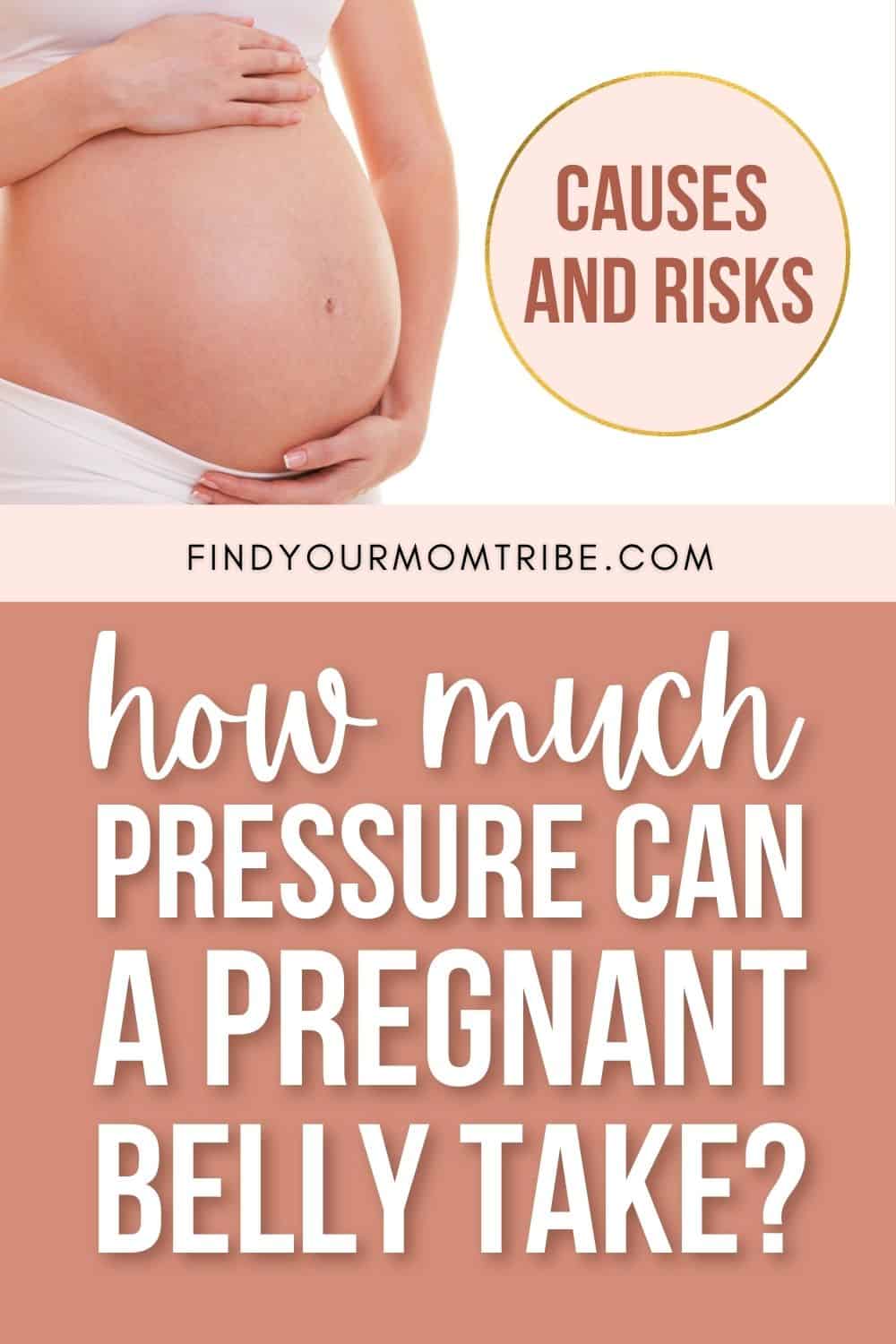
We love honesty! Find Your Mom Tribe is an Amazon Associate and we earn from qualifying purchases through affiliate links at no extra cost to you. Please see our full Amazon Affiliate disclosure for more information.

